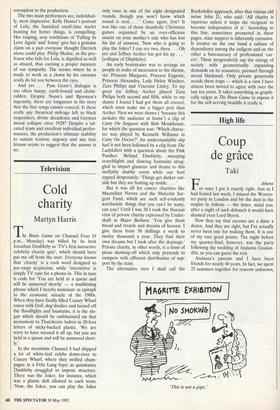Television
Cold charity
Martyn Harris
The Brain Game on Channel Four (9 p.m., Monday) was billed by its host Jonathan Dimbleby as `TV's first interactive celebrity charity quiz', which should have put me off from the start. Everyone knows that 'charity' is a cosh word designed to pre-empt scepticism, while 'interactive' is simply TV cant for a phone-in. This in turn is code for 'You are held in a queue and will be answered shortly' — a maddening phrase which I hereby nominate as epitaph to the economic miracle of the 1980s. When they have finally filled Canary Wharf tower with DoE dog'sbodies and turned off the floodlights and fountains, it is the slo- gan which should be emblazoned on that monument to Thatcherite hubris in 20-foot letters of sticky-backed plastic. 'We are sorry to have messed it all up, but you are held in a queue and will be answered short- ly.'
In the meantime Channel 4 had shipped a lot of white-tied celebs down-river to Canary Wharf, where they swilled cham- pagne in a Fritz Lang foyer as quizmaster Dimbleby struggled to impose structure. There was the Joker, for instance, which was a plastic doll allotted to each team. `Now, the Joker, you can play the Joker only once in one of the eight designated rounds, though you won't know which round is next. . . . ' Come again, Jon? It was like one of those shambolic Christmas games organised by an over-officious cousin on your mother's side who has lost his list of answers. 'Now who is going to play the Joker? I can see two, three . . . Oh yes and Jeffrey Archer has got his up . . . ' (collapse of Dimbleby).
An early brainteaser was to arrange six people in order of succession to the throne, viz: Princess Margaret, Princess Eugenie, Princess Alexandra, Lady Helen Windsor, Zara Philips and Viscount Linley. To my great joy Jeffrey Archer placed Zara Philips both second and fifth, while to my shame I found I had got them all correct, which must make me a bigger prat than Archer. Next we were shown ( 'because this includes the audience at home') a clip of Cany On Sergeant with Bob Monkhouse, for which the question was: 'Which charac- ter was played by Kenneth Williams in Cany On Doctor?' An understandable slip had it not been followed by a clip from The Ladykillers with a question about the Pink Panther. Behind Dimbleby, sweeping searchlights and dancing fountains strug- gled to impart glamour and drama to this ineffably shabby event while our host argued desperately: 'Things get darker out- side but they are hotting up inside. . . . '
But it was all for cancer charities like Macmillan Nurses and the Malcolm Sar- gent Fund, which are such self-evidently worthwhile things that you can't be nasty, can you? Until I was 30 I took the Shavian view of private charity expressed by Under- shaft in Major Barbara: `You give them bread and treacle and dreams of heaven. I give them from 30 shillings a week to twelve thousand a year. They find their own dreams but I look after the drainage.' Private charity, in other words, is a form of pious showing-off which only pretends to compete with efficient distribution of sup- port by the state.
The alternative view I shall call the
Rockefeller approach, after that vicious old swine John D., who said: 'All charity is injurious unless it helps the recipient to become independent of it.' According to this line, sometimes promoted in these pages, state support is inherently corrosive. It creates on the one hand a culture of dependency among the indigent and on the other a bureaucracy of professional 'car- ers'. These progressively sap the energy of society with geometrically expanding demands on its resources, pursued through moral blackmail. Only private generosity avoids these traps — which is a view I have almost been moved to agree with over the last ten years. It takes something as graphi- cally vulgar as The Brain Game to expose it for the self-serving twaddle it really is.
















































 Previous page
Previous page